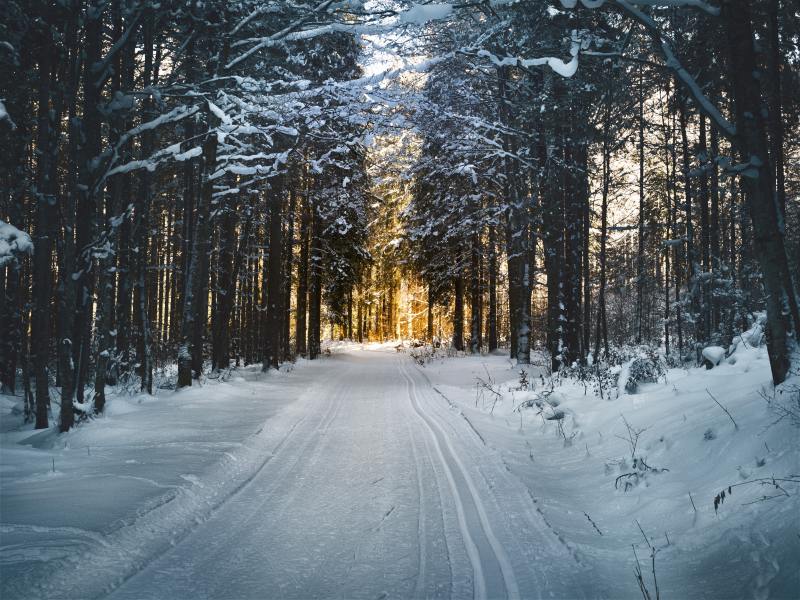Eric Liu’s column ‘The Mirror’ collects shards of thoughts and reflections on experiences he has lived, is living and will live. Treat them with care, as they were once a part of him, but don’t take them too seriously — they are only fragments of the whole picture.
After a snowstorm, I visited my middle school in Deerfield, Mass. I decided to hike in the snow. The road leading to the trail was muddy: the copper salt spilled on top of the snow had melted and mixed with the mud underneath, presenting a dirty and unappealing yellowish green. Moving toward the mountains, traces of human activity disappeared and after 20 minutes of walking, I stepped out onto an undisturbed, immaculate carpet of snow. My foot was immediately devoured, leaving intact only a few centimeters of space below my knee; but also engulfed was the noisy world outside. Suddenly, a glistering brilliance took over.
The tall pines blocked out the faint roars of cars on the highway. A few feet above the ground, the sun leaned leisurely on a maple branch, casting trails of gold. Beneath my feet, the soft snow squeaked, the only echoing sound in a shadowless world. I stopped moving, yet still I heard my breath thundering. I stopped breathing, yet still I sensed my heart drumming. Afraid of breaking this frozen world, I adjusted my breath until I couldn’t feel the heartbeat. Just as I closed my eyes —
Pffff! A clump of snow fell from a branch onto the one beneath it and burst into a million stars, the wind scattering them into nothing. Startled, I paused and submitted to the silence. I wanted to become another nameless tree, still and undisturbed. I wanted to be perfect.
My mom had always scolded me for being “good enough” and not “perfect.” I tended not to commit nor exclude opportunities, which drove her flaming mad. She’d often say, “You won’t succeed if you choose to be in the middle, the nobody. You should try to be the best in everything you do.” Although these conversations about “success” and “perfection” came up from time to time, they would always go in my right ear and out my left.
Being “good enough” did not bother me. I savored the anonymity it provided: I wasn’t the best, nor was I the worst. I sneaked in and out of places, and I liked keeping my options ajar. Perhaps, being the “nobody” manifested as a silent insurrection against the lifelong spotlight that haunts an only child. After all, theoretically, an only child in an Asian family has no better place to go besides a top 10 college. In Chinese, the word 万金油, or “ointment for all situations,” describes my kind of people: jack-of-all-trades, master of none. After getting rejected from multiple summer internship programs, I thought my mother might be right. Mediocrity never excels. The ointment stays in the skincare aisle, not the medicine section. It is never the “desired solution.”
Yet this world of perfection is also a world of death. I looked around, finding only bundles of scattered, charcoal-colored trees whose leaves were conspicuously absent. Dead. Underneath the snow, the used-to-be creek was now choked up by clumps of ice. On the trunks, brown moss and dried-up mushrooms were exposed and unburied. Even the wind was lifeless, torn apart by the branches. Suddenly I found myself exiled from the world that was full of disorienting noises and colors; that was imperfect, messy, complicated and not black-and-white. I missed the world where it was okay to be “good enough,” where I was allowed to sit in the snow-filled woods and not think about anything. Where I could appreciate the frozen present being pushed away by the next breath, and the next one, and so forth. I longed for a world where I could afford to be woken up by thoughts and feelings in the middle of the night, with my eyes wide open, to feel the time moving. I missed the world where it was okay to be not okay. But there, in the giant crystal ball of cold perfection, under the snow of responsibility and expectations, I was too afraid to make a sound; I was too scared to breathe.
Crack. A pine branch, snapped by the weight of snow, fell on the ground a few feet away. I came closer and saw how the impact had revealed the soil underneath the snow: rotten leaves, wet tree bark, fur and feathers. I thought I would be disturbed by the decomposed and moist clump, but its unorderly pattern was more soothing than the indifferent, textureless snow. I kicked more snow away and saw a thin trail of running water hidden beneath the rocks. Sporadic needles of sunlight flashed on its surface.
Ugly, beautiful, dead and alive. The woods were not perfect; they were alive.
Perhaps nothing alive is perfect. To be alive means to change, to move, to act and react, whereas perfection is frozen. It eliminates change; it restricts movement; it stalls the world into a crystal ball, forever stranded. It deprives the mind of curiosity. Trying to be perfect stole the present tense from my vocabulary. I decided to reclaim the present now. I was to break this façade of perfection.
So I looked down. I saw a pair of hands covered in gloves. Connected to them was my black down jacket, blending perfectly into the dark woods. And toward the middle of the coat was a zipper, half-opened. Inside the triangular opening, a dark gray hoodie rose with my breaths. Beneath the hoodie hung a compass-pendant necklace, lukewarm. Below a pair of snow-covered pants were two boots housing some frozen toes. I wiggled my toes, and they responded — partially.
I took a deep breath and a step forward, then another, and another, leaving a line of imperfection on the melting white.
